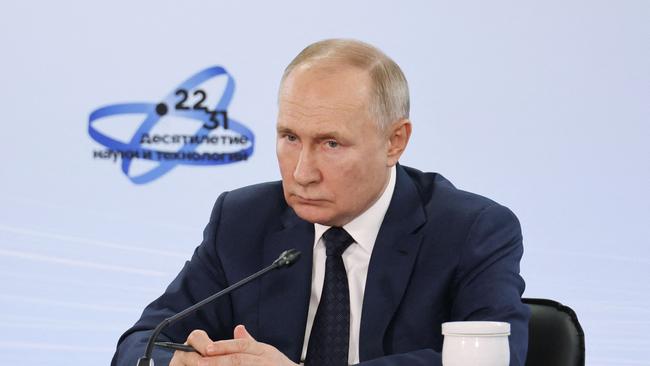Russia considers loyalty law for foreigners
Draft legislation would restrict what expatriates can say about Russian policy, social values and Soviet military history.

The Russian government is proposing a new law to force foreigners entering the country to sign a loyalty agreement restricting what they can say about government policy and social values, the latest clampdown on freedom of expression by the Kremlin since its invasion of Ukraine.
The draft legislation set out by the Interior Ministry also states that foreigners must not discredit Russian authorities or officials, contradict Soviet military history or disrespect the country’s “spiritual and moral values,” according to TASS state news agency.
If the law enters into force, foreigners would need to sign a consent form to enter the country. It couldn’t be determined what repercussions foreigners would face if they sign the proposed agreement and then violate it.
The proposed measures signal a further tightening of the screws on free speech in Russia, where voices of dissent have been increasingly silenced since President Vladimir Putin ordered his invasion of Ukraine in February 2022. The Kremlin refers to its invasion as a special military operation and has made it illegal to publish information it considers to be false about the conflict or to describe it as a war. The law carries a maximum penalty of 15 years in jail.
The Ministry of Internal Affairs, which governs law and order, didn’t immediately respond to a request for details on the draft legislation or when it will be submitted to parliament.
Kremlin spokesman Dmitry Peskov declined to comment.
In the past 21 months since the start of the war, several independent Russian news outlets have closed their doors and hundreds of journalists have fled the country, while other Russian-language publications were shut down, started to work in secret or went into exile abroad. Many Western news organisations stopped operating in Russia and moved their staff out of the country.
The detention in March of Wall Street Journal reporter Evan Gershkovich had a further chilling effect on Western media in Russia. Gershkovich, a 32-year-old U.S. citizen who was accredited by Russia’s Foreign Ministry to work as a journalist, was detained by Federal Security Service agents during a reporting trip on an espionage allegation, which the reporter, the Journal and the U.S. government vehemently deny.
A number of Western news outlets have brought staff back to Russia in recent months, while others opted to have their reporters travel in and out of the country.
Civil-rights activists and legal experts said that, if passed, the law would essentially muzzle the foreign press, making it difficult for them to work in Russia unless they adhere to Moscow’s narrative about the war in Ukraine and other issues.
“By signing this ban, they will lose the right to objective coverage of events taking place in the country. And if they refuse to sign this, they simply will not be able to stay in the Russian Federation,” Perviy Otdel, a community of lawyers and human rights activists, said on Telegram.
It couldn’t be determined what consequences other foreigners in the country, such as business people and students, would face if they were to violate the planned law.
The Kremlin has sought to blame the West for trying to destroy what it calls “traditional values” in countries that are more socially conservative. Senior Russian officials and the Russian Orthodox Church have portrayed gay-rights activism as a symbol of the West’s moral decline, which they say is directed at uprooting conservative beliefs in countries such as Russia. On Thursday, Russia’s Supreme Court is scheduled to consider a lawsuit filed by the country’s Ministry of Justice, which is seeking to have the international LGBT movement recognised as extremist and its activities banned inside the country.
In recent years, and in particular since Russia attacked Ukraine, Russian officials have accused the West of playing down the role the Soviet Union played in defeating fascism and ending World War II. The Kremlin has also sought to falsely paint the current government in Kyiv as run by neo-Nazis.
The Wall Street Journal



To join the conversation, please log in. Don't have an account? Register
Join the conversation, you are commenting as Logout